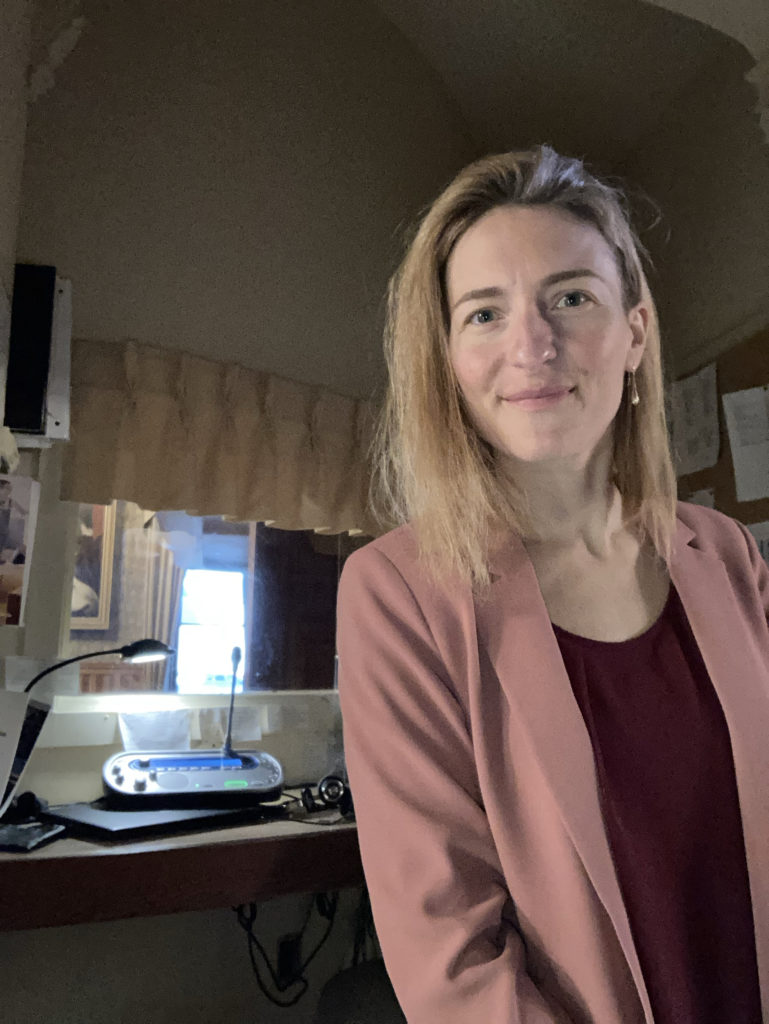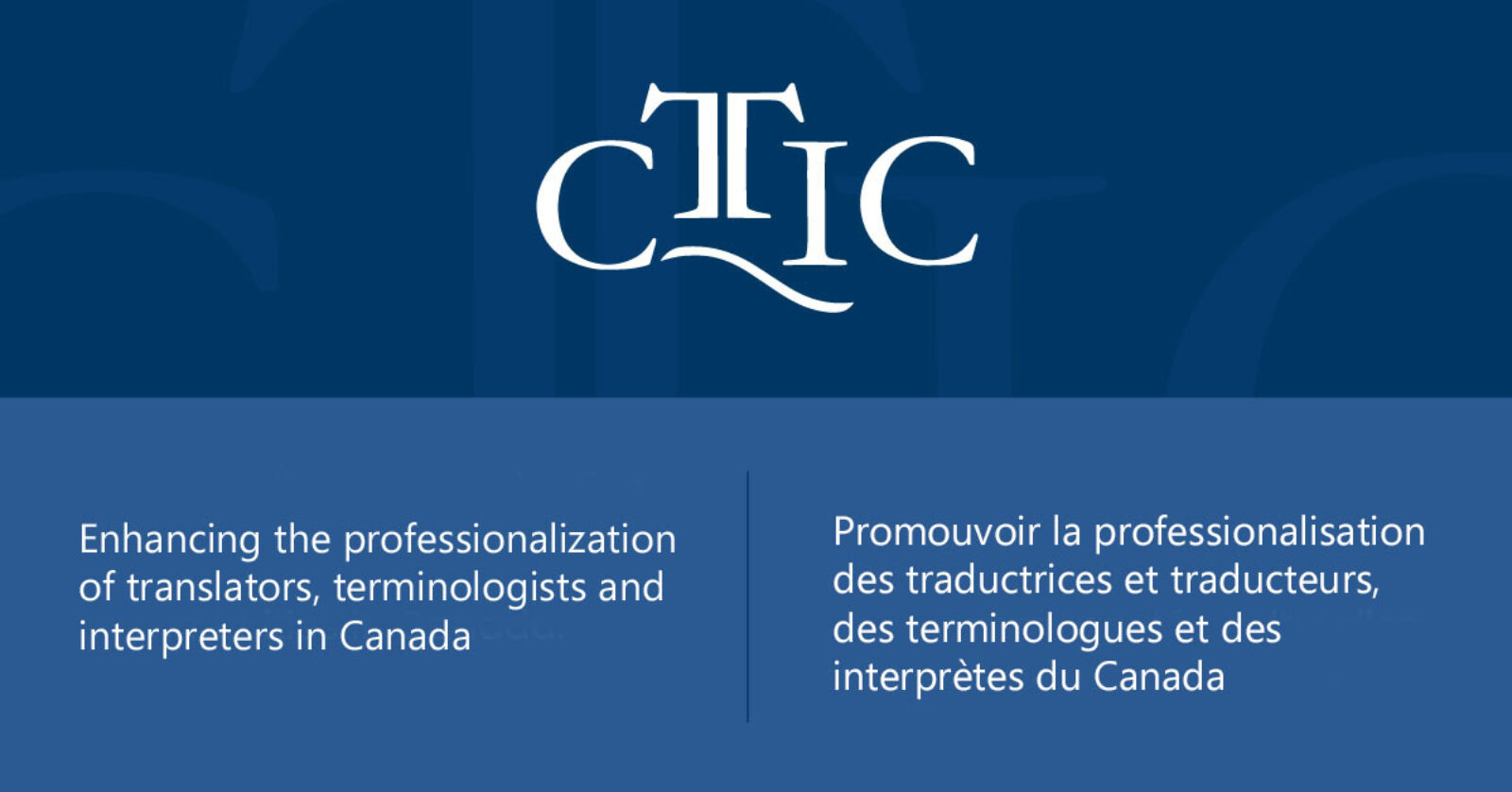An interview with Angela Fairbank, CTTIC Vice-President (2019-2022), previously published in the STIBC Voice Newsletter, April 2022, pages 5 to 7.

(c) Laura Bonney
Translator, Terminologist, Interpreter, which of these three professions do you identify with?
I am an Interpreter.
Please provide a brief synopsis of your education—including language education—and background related to how you came to be a Translator/Interpreter/Terminologist, for example, immersion in foreign countries and culture, university education, mentorship/menteeship, internship, etc.
Originally from France, I completed my undergraduate degree and my Master’s in Translation in Paris—in addition to a semester in Málaga, Spain—with an English, Spanish and French language combination. I graduated in 2005 and moved shortly thereafter from Paris to Moncton, New Brunswick where I started working at a translation company. In 2008, I moved to Fredericton and became a translator at the New Brunswick Translation Bureau.
In 2010, I took a leave of absence to obtain a Master’s in Conference Interpreting in Ottawa and then returned to my translation job at the Translation Bureau until 2012, when I started working there as an Interpreter.
Where do you currently exercise your profession and how long have you been working there?
I have been Chief Interpreter at the Translation Bureau in Fredericton, New Brunswick for the last four years.
Are you certified in your profession? If so, by which certification organization(s) and for how long have you been certified? If you are certified, once you became certified, did you notice your income increase slightly, moderately or substantially?
Yes, I am a Certified Interpreter. I received my certification through CTINB. There was no change to my income after obtaining my certification.
What have been some of the highlights of your career so far?
I have a fond memory of the time when, early in my career, at the end of a court assignment, one of the lawyers asked for my business card. I knew then that I had done a noticeably good job!
Every day I feel I have done a good job is a highlight. I love my job and am so happy I took the risk of leaving my translation job to go through the training and the growing pains to be where I am today.
Have there been any particular challenges in your profession that you would like to share with our readers?
The move to online interpretation and the poor sound quality that has come with it has been extremely challenging. We tell clients about the importance of having clear sound, we give them directions and tips, but the message gets lost with some individuals. The fact is that we can’t interpret what we can’t hear properly, and interpreters listen differently from regular listeners. The acknowledgement “We hear you loud and clear” from participants doesn’t mean much more to an interpreter than “Yes, your microphone is on.” Over the past couple of years, we have ended many an assignment shaking our heads in frustration.
What advice do you have for colleagues who are just starting—or thinking of starting—in the profession today?
To those thinking of starting, I would say start training on your own. Get in touch with an interpreter so they can tell you how to become one, because the technique can be self-taught! It takes a lot of deliberate practice, hard work and discipline—all worth it once you have reached the required level. Then join peer-to-peer practice groups where you can get pointers and feedback from peers. The industry cannot rely on programs to train new interpreters; there are not enough classroom seats to fill the need.
To those starting out, I would say it does get easier, simply because the more you know, the more you understand and the better you become at interpreting. However, never stop improving your technique and language skills, because complacency is your enemy.
As President of CTINB (https://ctinb.nb.ca/en/), please tell us about this association, when it was created and why, how many members (certified and otherwise) it has currently, and what challenges it has as a smaller sister society under the CTTIC umbrella. What perks do you offer your members?
The Corporation of Translators, Terminologists and Interpreters of New Brunswick (CTINB) was founded in Fredericton in 1970 after the New Brunswick Official Languages Act was passed in 1969. It became a member of the Canadian Translators, Terminologists and Interpreters Council (CTTIC) in 1972.
CTINB has about 130 certified members and about 40 candidates for certification. Our main challenge is that we have only one casual staff person, which means a lot of work is left for the volunteer board members to accomplish.
The perk is that we have low membership fees. Every year we offer training sessions to our members at a reduced cost. Last year, we even offered these for free as we had the funds to do so.
Could you tell us a bit more about your work at the Translation Bureau of New Brunswick and the challenges New Brunswick has as the only officially bilingual province of Canada?
Interpreters at the Translation Bureau work for all government departments (press conferences, meetings, conferences, training sessions, etc.), the Legislature, Courts and administrative tribunals from and into English and French. We also offer our services to the City of Fredericton for their city council meetings. Being a bilingual province, the need for interpretation services is very high, and we have only seven staff interpreters and one dispatcher who processed over 2,600 requests last year! Of course, we work with freelancers, and Zoom has enabled us to obtain help from freelancers located outside the province, but as we start working on-site again, we are going to feel the need to attract more interpreters to the region quickly.
Is there anything I missed that you would like to add?
Did I mention we need more interpreters here in New Brunswick? If you are an interpreter with an EN<>FR language combination, you should seriously consider moving to New Brunswick, where there is a great deal of interesting work, wonderful colleagues, and the quality of life is top-notch!
